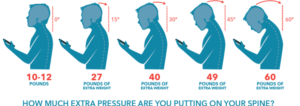Forward Head Affects Your Mood & Brain function
Introduction
Unfortunately, our obsession with our smartphones has made many of us develop forward head posture. Why is this bad? Every time we lean forward 60 degrees, the stress on our necks increases by approximately 30 kgs. In fact, every time you move your head forward an inch (2.5 cm), an extra 10 pounds (5 kgs) of weight is added to your neck. As a result, forward head posture leads to chronic pain, numbness in the arms and hands, improper breathing, and pinched nerves.
That’s not all. It turns out, forward head posture doesn’t just affect us physically. It affects our mood as well. Thanks in no small part to our smartphone addiction, most of us are constantly putting undue strain on our necks and spinal cords, which has adverse effects on our emotions.
The effects of Forward Head Posture on Mood and Brain Function
That’s right: Not only do asthma and heart disease can begin in your neck, but so does your brain health. For instance, posture has an impact on feelings of stress, mood, memory, and even behavior.
A 2010 study from Brazil examined posture and body image in people with major depressive disorder. Over 10 weeks, 34 participants with depression, and 37 healthy volunteers had their posture assessed. Researchers found that patients’ posture changed, including instances of forward head posture, during episodes of depression. There was also a “mild dissatisfaction with body image.”
Further, the Department of Clinical Psychology at the University of Hildesheim in Germany gathered 30 depressed inpatients to “investigate the effects of sitting posture on the tendency of depressed individuals to recall a higher proportion of negative self-referent material.” The findings showed that posture can affect memory.
The participants were randomly assigned to sit in a slouched or upright position. Those who sat upright showed no bias in word recall while those who slumped recalled mostly negative words.
In addition, poor posture has been shown to affect stress response. In 2015, Health Psychology: The Official Journal of the Division of Health Psychology, American Psychological Association published the results of a randomized trial on how posture affects stress responses. Seventy-four participants were randomly assigned to either upright or slumped seated posture. For the experiment, participants’ backs were strapped to hold the assigned posture.
The “upright participants reported higher self-esteem, more arousal, better mood, and lower fear, compared to slumped participants.” In addition, those sitting in a slumped position “used more negative emotion words, first-person singular pronouns, affective process words, sadness words, and fewer positive emotion words and total words during the speech.”
Researchers concluded that good posture in the face of stress maintains self-esteem, improves mood, increases the rate of speech, and reduces self-focus. Meanwhile, poor posture actually resulted in more stress, potentially leading to chronic stress.
The ways to improve it
A lot of the poor posture out there, whether it’s slumping or forward head posture, is the result of the devices we use. From computers to tablets to smartphones, they all require a different angle to utilize, all of which throw our posture off. And it turns out, the size of device matters — but it’s not what you may think. Instead of larger devices causing more problems, the opposite seems to be true. That’s because the smaller the device, the more we must move our heads or necks forward.
The good news is there are many steps you can take to correct your slumping or forward head posture. Structural Chiropractic corrects your underlying structure that all muscles and ligaments attach to, which will help you feel and function better. It will also help relieve joint pain, stiffness, and improve muscle balance.
Posture seems to influence behaviour. A study in Japan worked to correct elementary students’ posture, focusing on all four major components of posture: feet, buttocks, back, and the entire body. After practicing and promoting good posture in class, not only did posture increase roughly 20 percent to 90 percent in students, but students’ classroom performance improved as well.
Of course, you can always incorporate posture exercises to correct that pesky forward head posture and improve your mood and mental health but these won’t CORRECT the underlying structure. These include:
- Arm circles
- Arm closes
- Chin tuck
- Thoracic extension stretch
- Push up
- Cats and dogs
- Lateral raises (straight and bent)
- Rows
- Pull-ups.
Conclusions
• Forward head posture leads to chronic pain, numbness in the arms and hands, improper breathing, and pinched nerves. But that’s not all. It can also affect our mood.
• Poor posture also has been shown to affect depression, memory, stress response, self-esteem, body image, and even brain function and behaviour.
• You can improve posture through chiropractic adjustments, and posture exercises like chin tuck, push up plus, thoracic extension, arm circles, cats and dogs, lateral raises, rows, and pull-ups.
Looking for a Chiropractor in Auckland?
Contact Revolution Chiropractic – Leading Sports Chiropractor Auckland
To Schedule your FREE CONSULTATION at Revolution Chiropractic E-mail or Call us on 09 418 3718.
You can also book online here!
Follow us on Instagram Or Twitter, connect with us on LinkedIn, become a fan on Facebook.








